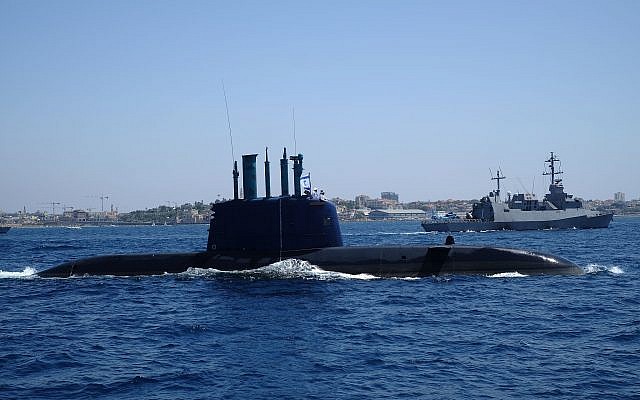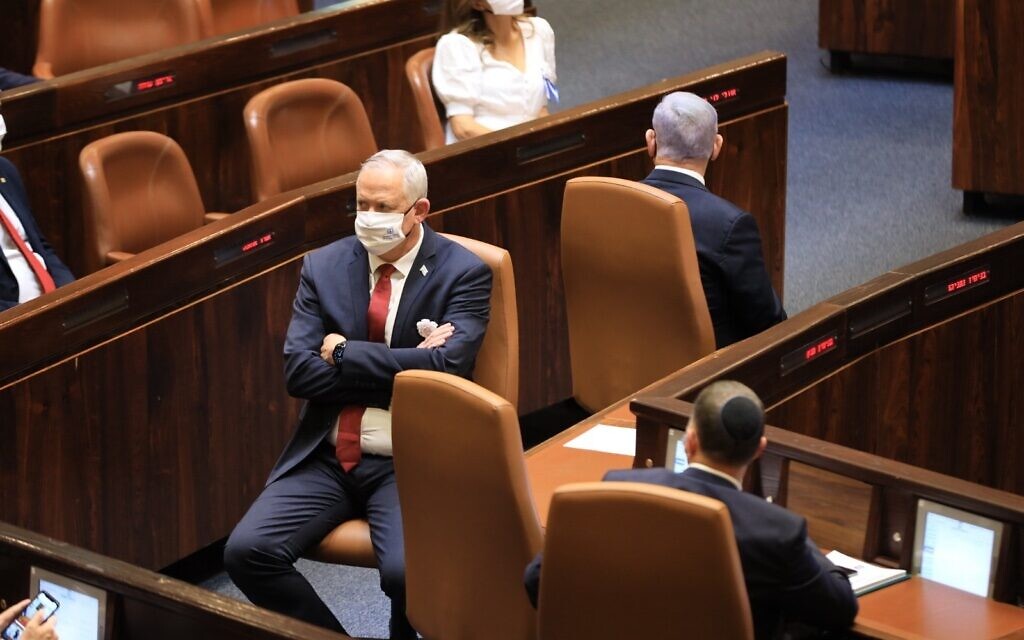Unclear if new investigation will win necessary government support; if approved, commission would be able to subpoena witnesses, have broader legal powers

Defense Minister Benny Gantz ordered a fresh probe of the so-called submarine scandal on Saturday night, after his previous attempt to launch an inquiry was called off by the attorney general to avoid a conflict with his own criminal investigation of the matter.
This new investigation must receive approval from the government. It was not immediately clear if the motion would receive the broad support necessary. Spokespeople for Prime Minister Naftali Bennett and Foreign Minister Yair Lapid told The Times of Israel the matter would be discussed within the government. Unnamed officials in the coalition told Channel 12 that Gantz’s proposal was petty and had not been coordinated with the rest of the government.
The submarine affair, also known as Case 3000, revolves around allegations of a massive bribery scheme in Israel’s multi-billion-shekel purchase of naval vessels — submarines and large missile ships — from German shipbuilder Thyssenkrupp. The scandal also involved the sale of two Dolphin-class submarines and two anti-submarine warships by Germany to Egypt, allegedly approved by former prime minister Benjamin Netanyahu without consulting or notifying then-defense minister Moshe Ya’alon and then-IDF chief of staff Gantz. Israel had long been granted an unofficial veto over such sales by Germany.
While several of Netanyahu’s close associates have been indicted in the case, which involves suspicions Israeli officials were bribed to ensure Thyssenkrupp won the contract, the former premier has not been directly implicated, and the attorney general has said he is not a suspect.
Netanyahu, who was accused by former defense minister Ya’alon of having led the alleged improper effort to buy the submarines from Thyssenkrupp, has previously blocked a number of efforts to form a parliamentary commission of inquiry.
Last year, Gantz announced that his ministry was launching an internal investigation of the scandal, a move that did not require external approval. However, this probe quickly fell apart as the attorney general voiced concerns that it would interfere with his own criminal inquiry, which resulted in a number of indictments last month.

“Following staff work that took place in recent months, Defense Minister Gantz decided to bring to the government a recommendation for the formation of a state inquiry commission into the purchase of the submarines and ships,” his office said.
As a state inquiry, the commission would have the power to subpoena witnesses, forcing them to appear for questioning — something that his previous ministerial probe could not do.
Gantz’s office said he would continue the preparatory work for the proposal shortly and present it to the attorney general in the coming days.
“I expect that this time all the ministers in the government will support the formation of a commission. We cannot allow open questions to remain and we must draw broad conclusions. A criminal probe is not enough for the worst security scandal in the history of the State of Israel,” his office said.

In addition to the reported internal griping in the coalition, Gantz’s announcement also drew swift condemnation from Netanyahu’s Likud party, which claimed that the defense minister had in the past said there was no need for an independent inquiry into the submarine scandal.
“Gantz is continuing his blind pursuit of Netanyahu and Likud,” the party said in a statement.
The defense minister’s Blue and White party fired back, blaming the former premier for scuttling previous attempts to investigate the scandal.
“The former prime minister and Likud prevented the formation of a state commission of inquiry over the last year, and now the time has come to bring the matter to a thorough examination, so that Israel’s security will never be harmed,” Blue and White wrote on Twitter.
Last month, prosecutors filed indictments for bribery, money laundering and tax offenses at the Tel Aviv District Court Monday against Miki Ganor, who was the local agent for Thyssenkrupp. Avriel Bar-Yosef, once Netanyahu’s pick to be head of the Israel National Security Council, was indicted for bribery and breach of trust.
In addition, indictments for bribery, money laundering and breach of trust were filed against Netanyahu’s former chief of staff David Sharan; former chair of the fundraising organization Keron Hayesod (United Israel Appeal) Eliezer Sandberg; Brig. Gen. (res.) Shay Brosh, a former commander of the Israeli Navy’s commando unit; Rami Taib, a former political adviser to former Likud minister Yuval Steinitz; and media adviser Yitzhak Liber.
Alongside the indictments, cases were closed against David Shimron, cousin and former personal lawyer to Netanyahu, as well as former commander of the Israeli Navy Eliezer Marom, after prosecutors accepted their defenses at their respective pre-indictment hearings.
In October, the state prosecution told the High Court of Justice that it believed there was no justification to open a criminal probe into Netanyahu over the matter.
Netanyahu is already on trial for fraud and breach of trust in three other cases, and bribery in one of them. He denies any wrongdoing and claims to be a victim of an attempted political coup involving the police, prosecutors, left-wing opposition and the media.
As reported by The Times of Israel
